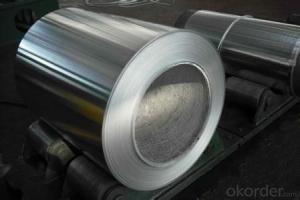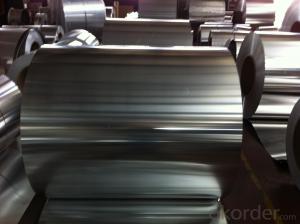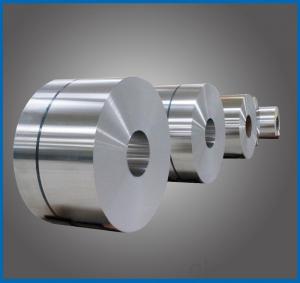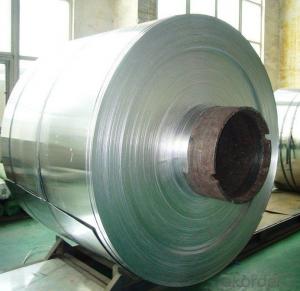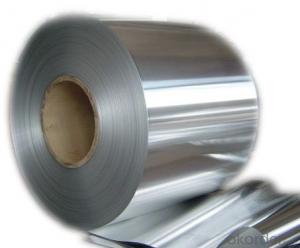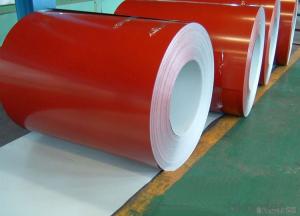Aluminum coil for roofing
- Loading Port:
- China Main Port
- Payment Terms:
- TT OR LC
- Min Order Qty:
- -
- Supply Capability:
- -
OKorder Service Pledge
OKorder Financial Service
You Might Also Like
Aluminium is a relatively soft, durable, lightweight, ductileand malleablemetalwith appearance ranging from silvery to dull gray, depending on the surfaceroughness. It is nonmagnetic and does not easily ignite. A fresh film ofaluminium serves as a good reflector (approximately 92%) of visible lightand an excellent reflector (as much as 98%) of medium and far infraredradiation. The yield strength of pure aluminium is 7–11 MPa,while aluminium alloys have yield strengths ranging from200 MPa to 600 MPa. Aluminium has about one-third the densityand stiffness of steel. It is easily machined,cast, drawn and extruded.
Aluminium alloys (or aluminum alloys; see spellingdifferences) are alloysin which aluminium(Al) is the predominant metal. The typical alloying elements are copper, magnesium,manganese,silicon,tin and zinc. There are twoprincipal classifications, namely casting alloys and wrought alloys, both of which are furthersubdivided into the categories heat-treatableand non-heat-treatable. About 85% of aluminium is used for wrought products,for example rolled plate, foils and extrusions.Cast aluminium alloys yield cost-effective products due to the low meltingpoint, although they generally have lower tensile strengthsthan wrought alloys. The most important cast aluminium alloy system is Al–Si,where the high levels of silicon (4.0–13%) contribute to give good castingcharacteristics. Aluminium alloys are widely used in engineering structures andcomponents where light weight or corrosion resistance is required
Specification:
Alloy: AA1050, 1060, 1100,AA3003, 3005, 3015, 5052, 5754, 5083,8011, etc
Temper:H14/16/18/22/24/32, HO etc.
Thickness:0.2mm—100mm
Width: 100mm—2300mm (Can be slitted)
InnerDiameter: 508MM
Coil Weight:500kg-3000kg(Max.)
Application:Foil stock, Circles, Roofing, Can stock, Marine plate,Anti-slipery purpose in vehicles, packing and appliance.
Features:
1. Excellent quality of products
2. Quick delivery
3. Best service to clients
4. BV,SGS avalible
5. No buckle o waveness
6. Tension leveling
7. Certificate of Origin
8. Form A,E
Packaging Detail:
Carton ,Woodenpallet with plastic protection packing ,standard seaworthy packing or as yourrequest.
ProductionCapacity:
AnnualProduction capacity of 600,000 tons.
Products areexported to United States, Canada, U.A.E, Brazil, Mexico,Thailand, Vietnam,Nigeria etc, over 100 countries andregions all over the world.
Production Line:
CNBM aluminumproduction base is comprised of 18 aluminumannealers, 10 coil and foilmills, 4 continuous production lines, 2hot rolling production line and 3prepainted lines.
FAQ:
1. What is the form of payment?
Normally 30% TT, L/C
2. Type of quotation?
FOB, CFR, CIF
3. Port of loading?
Shanghai port
4. Delivery time?
30 day after client’s deposit
- Q:Are aluminum coils available in different colors?
- Yes, aluminum coils are available in different colors.
- Q:Can aluminum coils be used for HVAC systems?
- Yes, aluminum coils can be used for HVAC systems. Aluminum coils are commonly used in HVAC systems as they offer several advantages over other coil materials. Firstly, aluminum is a lightweight material, which makes it easier to handle and install. This can result in lower installation costs and reduced strain on the structure of the HVAC system. Secondly, aluminum coils have excellent heat transfer properties. They efficiently transfer heat from the refrigerant to the surrounding air, which is crucial for the effective functioning of the HVAC system. Aluminum coils also have a high resistance to corrosion, which is particularly important in humid environments or areas with high levels of pollutants. Additionally, aluminum is a highly recyclable material, making it an environmentally friendly choice for HVAC systems. It can be easily recycled and reused, reducing the need for new material extraction and minimizing waste. Overall, aluminum coils are a reliable and efficient choice for HVAC systems, providing excellent heat transfer, durability, and environmental sustainability.
- Q:What are the potential applications of painted aluminum coils?
- Painted aluminum coils have a wide range of potential applications due to their durability, versatility, and aesthetic appeal. One of the most common applications is in the construction industry, where painted aluminum coils are used for roofing and siding materials. The painted coating enhances the longevity of the aluminum by providing protection against corrosion, UV rays, and harsh weather conditions. Additionally, painted aluminum coils find applications in the manufacturing of transportation vehicles. The lightweight nature of aluminum makes it an ideal material for automotive parts, such as body panels and trim. The painted coating not only enhances the appearance of the vehicle but also provides a protective layer against scratches and dents. Another potential application of painted aluminum coils is in the production of household appliances. The painted coating adds a distinct finish to appliances like refrigerators, ovens, and washing machines, making them more visually appealing. Moreover, the protective layer helps to prevent damage from everyday use, increasing the lifespan of the appliances. Furthermore, painted aluminum coils find use in the signage industry. The ability to apply vibrant colors and designs on the coils makes them suitable for creating eye-catching signs and billboards. The durability of the painted coating ensures that the signage remains vibrant and intact even in outdoor environments. In the furniture industry, painted aluminum coils can be used for manufacturing various pieces such as chairs, tables, and cabinets. The lightweight nature of aluminum makes the furniture easy to move and transport, while the painted coating adds a stylish and modern touch to the designs. Overall, the potential applications of painted aluminum coils are vast and diverse, ranging from construction and automotive to appliances, signage, and furniture. The combination of durability, versatility, and aesthetic appeal makes painted aluminum coils a popular choice in various industries.
- Q:When you open an aluminum beverage can, do particles of aluminum get into the drink?
- It depends on the type of drink inside the can. Aluminium is a metal in the group three of the periodic table of elements so it has three positive charges when ionized although it has metallic bond between its nucleus and its electrons. If the drink contains too much acid such as HCl with a high concentration the acid may react with the aluminium can if it is not coated or galvanized. Although it may not physically break off for the particles to enter the drink, it may dissolute in the kind of substance inside the drink.
- Q:Can aluminum coils be used for seamless gutters?
- Seamless gutters can indeed utilize aluminum coils. The reason aluminum is favored for gutter systems is its ability to withstand wear, its lightweight composition, and its resistance to rust. Aluminum coils are frequently employed in the construction of seamless gutters, which boast several advantages over the more traditional sectional gutters. Custom-made on-site, seamless gutters guarantee a flawless fit for the specific measurements of a structure. This eliminates the necessity for seams, which are susceptible to leaks and require regular maintenance. Moreover, aluminum is malleable, making it easy to shape seamless gutters to accommodate a building's unique design. In summary, aluminum coils present a practical and efficient option for the creation of seamless gutters.
- Q:Are aluminum coils suitable for architectural roofing systems?
- Yes, aluminum coils are suitable for architectural roofing systems. Aluminum is a popular choice for roofing due to its numerous advantages. Firstly, aluminum is lightweight, which makes it easier to handle during installation and reduces the load on the building's structure. Additionally, aluminum is highly durable and corrosion-resistant, making it a long-lasting option for architectural roofing systems. It also has excellent thermal properties, reflecting heat and reducing energy consumption. Moreover, aluminum coils can be easily shaped and formed into various profiles and designs, allowing for flexibility in architectural styles. Lastly, aluminum is a sustainable material as it is recyclable, making it an environmentally friendly choice for roofing systems. Overall, aluminum coils are a suitable and practical option for architectural roofing systems, providing durability, versatility, and energy efficiency.
- Q:Can aluminum coils be used for automotive heat shields?
- Yes, aluminum coils can be used for automotive heat shields. Aluminum is a commonly used material for heat shields due to its excellent thermal conductivity and high melting point. It is lightweight and has good corrosion resistance, making it ideal for automotive applications. Aluminum coils can be easily formed into the desired shape and provide effective heat insulation, protecting sensitive components from excessive heat generated by the engine or exhaust system. Additionally, aluminum is cost-effective and readily available, making it a popular choice for automotive heat shields.
- Q:What maintenance is required for aluminum coils?
- Maintenance for aluminum coils typically includes regular cleaning and inspection to ensure efficient performance and longevity. Here are some specific maintenance requirements for aluminum coils: 1. Cleaning: Regularly clean the aluminum coils to remove dirt, dust, and debris that can accumulate on the surface. Use a soft brush or a vacuum cleaner with a brush attachment to gently remove any loose particles. Avoid using abrasive cleaners or brushes that can scratch or damage the surface of the aluminum. 2. Inspection: Periodically inspect the aluminum coils for signs of damage or wear. Check for any bent or dented fins, which can restrict airflow and reduce the coils' efficiency. Look for signs of corrosion, such as discoloration or pitting, as this can affect the coils' performance and lifespan. 3. Coil Protection: Apply a protective coating or sealant to the aluminum coils to prevent corrosion and damage from exposure to moisture, chemicals, or harsh environmental conditions. This can help prolong the life of the coils and maintain their performance. 4. Lubrication: If your aluminum coils are part of a mechanical system, such as an HVAC unit, ensure that any moving parts are properly lubricated. This can help reduce friction and wear on the coils, improving their efficiency and preventing premature failure. 5. Professional Maintenance: Consider scheduling regular professional maintenance for your aluminum coils, especially if they are part of a larger system. HVAC technicians or specialized coil cleaning services can provide a thorough inspection, cleaning, and maintenance to ensure optimal performance and identify any potential issues early on. By following these maintenance practices, you can help extend the lifespan of your aluminum coils, improve their efficiency, and prevent costly repairs or replacements.
- Q:Supposably water ozidies it what ever that means so how in the world do i clean an aluminum bike if i cant use water? i like to use water and soap on my carbon bike so what do i use on a aluminum?
- I have a couple of steel, one carbon, and a couple aluminum bikes. I've ridden all in the rain and washed all with soap and water. Water will not damage the aluminum bike at all. Wash away.
- Q:Can aluminum coils be used for electrical connectors?
- Yes, aluminum coils can be used for electrical connectors. Aluminum is a commonly used material for electrical connectors due to its excellent conductivity, lightweight nature, and cost-effectiveness. However, it is important to note that aluminum has a lower conductivity compared to copper, so it may not be suitable for applications that require high electrical currents or low resistance connections.
1. Manufacturer Overview |
|
|---|---|
| Location | |
| Year Established | |
| Annual Output Value | |
| Main Markets | |
| Company Certifications | |
2. Manufacturer Certificates |
|
|---|---|
| a) Certification Name | |
| Range | |
| Reference | |
| Validity Period | |
3. Manufacturer Capability |
|
|---|---|
| a)Trade Capacity | |
| Nearest Port | |
| Export Percentage | |
| No.of Employees in Trade Department | |
| Language Spoken: | |
| b)Factory Information | |
| Factory Size: | |
| No. of Production Lines | |
| Contract Manufacturing | |
| Product Price Range | |
Send your message to us
Aluminum coil for roofing
- Loading Port:
- China Main Port
- Payment Terms:
- TT OR LC
- Min Order Qty:
- -
- Supply Capability:
- -
OKorder Service Pledge
OKorder Financial Service
Similar products
New products
Hot products
Hot Searches
Related keywords

